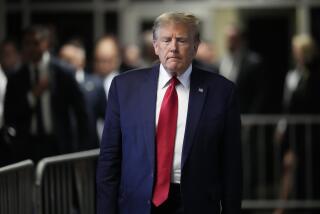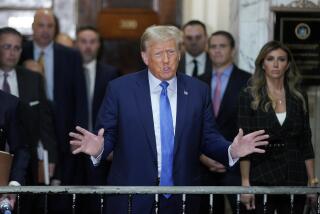Federal Judge Scolds, Fines Northrop Foe : Lawyer Hafif Sanctioned; He Sees Crippling Effect on ‘Whistleblower’ Suits
- Share via
A federal judge has ordered well-known Claremont lawyer Herbert Hafif to turn over the names of current and former Northrop employees who have provided information to his firm for a major “whistleblower” lawsuit alleging fraud on the MX missile program.
Declaring that Hafif’s actions were “ethically questionable,” U.S. District Judge David Kenyon imposed $5,000 in sanctions and ordered Hafif to pay Northrop’s legal fees, which the company estimated to be $50,000.
Kenyon also ordered Hafif to allow Northrop attorneys to review any company documents Hafif’s firm has obtained from employees and provide a log of all persons to whom he has shown any documents determined by Northrop to be privileged or confidential.
Hafif claimed that the rulings would “virtually cripple” whistleblower suits brought by employees or other insiders to expose fraud in government contracting. He said he would ask the court to reconsider its order, because it would force him to breach promises of confidentiality made to Northrop employees and other witnesses.
Questions About Propriety
Kenyon issued the monetary sanctions after he found that Hafif had obtained the signature of Stephen Wheeler, a plaintiff in the MX missile case, on a blank declaration attesting to the accuracy of certain statements. The declaration was then attached to a series of answers ostensibly by Wheeler to questions from Northrop about key issues in the MX case and filed with the court.
Lawyers for the corporation protested the signature when the statements filed with Wheeler’s declaration differed substantially from responses to similar questions in a sworn deposition taken several days later.
“The court has serious questions as to the propriety of the actions of plaintiffs’ counsel,” said Kenyon in three rulings that represented a substantial victory for Northrop in the company’s long-running battle with Hafif’s firm.
“The use of pre-signed verifications creates the impression that the signer has carefully reviewed the contents of the documents and has contemporaneously affirmed their accuracy,” the judge said. “The court believes that sanctions are appropriate. Counsel’s actions were, at the very least, misleading and ethically questionable.”
But Hafif said in an interview Tuesday that Wheeler was dying when he gave the deposition on June 17 and June 19 and that he was “lapsing into and out of a comatose state.” Wheeler died of the effects of acquired immune deficiency syndrome on June 29.
Hafif added that the use of pre-signed verifications for the release of employment and medical records, as well as for verifications, is common practice in civil law. He said it isn’t unusual for civil attorneys to handle upward of 100,000 pretrial requests from opposing lawyers in all their cases and that pre-signed forms expedite the paper work.
Filed Five Suits
In any case, Hafif said, all responses in the document Hafif filed on Wheeler’s behalf were true. If the responses differed from those Wheeler gave in his deposition, it was because of Wheeler’s illness at the time the deposition was taken, he said.
Hafif has filed five whistleblower suits alleging that Northrop committed various acts of fraud in the MX, B-2 bomber and other defense programs. The Justice Department has declined to participate in two of the cases, two cases are still being reviewed by the government for possible participation, and a fifth was dismissed on technical grounds.
The lawsuit at issue in Kenyon’s ruling was filed in 1987 under the federal False Claims Act and alleges that Northrop defrauded the Air Force in supplying key portions of the guidance system for the MX missile. Wheeler and the other former Northrop employees who filed the suit allege that Northrop knowingly used defective parts on the electronic guidance system and that the company falsified tests of electronic parts.
Hafif represents the clients suing under a special federal statute allowing private citizens to collect damages by acting as the public’s representative in defense fraud lawsuits. The law allows the plaintiffs to share in any damages won by the government.
Hafif was particularly concerned about Kenyon’s ruling barring him from any contact with present Northrop employees or any former employees who had access to confidential company information without advance permission from Northrop’s attorneys.
He said a recent revision of the California Bar Assn. rules specifically permits a plaintiff’s attorney to contact current and former employees of a corporation.
The order also requires Hafif to turn over to the court for private review by the judge a list of all current and former Northrop employees with whom his firm has communicated since October, 1986, the date and location of each contact, whether the contact was initiated by the employee or by the lawsuit plaintiffs, and whether that employee provided Hafif with any Northrop documents.
Must Prepare Log
Northrop is to receive a copy of the list, except that employees’ names will be deleted from that log. The court order also requires Hafif to allow Northrop attorneys to review all Northrop documents in Hafif’s possession and requires Hafif to return any documents which Northrop determines are subject to an attorney-client privilege, together with all copies of the documents.
Finally, Hafif was ordered to prepare a log of all people who were shown or given copies of documents which are determined to have been privileged, including the address and telephone number of each person who was shown the document, when the disclosure occurred, and whether the person was permitted to make a copy of the document.
Hafif said the order could cripple the ability to mount whistleblower lawsuits against major corporations, lawsuits which may depend upon information from current and former employees who have been promised confidentiality.
“Left as it stands, it would virtually cripple whistleblower cases,” Hafif said. “It is very upsetting.”
Hafif said fulfilling Kenyon’s order would force him to breach confidentiality of various individuals who have supplied information and documents.
“We can’t do that with respect to people we have promised confidentiality,” he said. “Perhaps the U.S. Supreme Court would have to confirm that order.”
He also characterized the Northrop motion for the order as a “high technical motion” that would “keep the case from being resolved on its merits.”
But the judge, in making his ruling, cited a number of court cases which have held that attorneys are prohibited from making any out-of-court contacts with current employees of a corporation they are opposing in court.
“Plaintiffs’ counsel is not excused merely because Northrop employees allegedly initiated the contacts,” the court said. “Nor is it sufficient to state that plaintiffs tried to avoid obtaining any confidential information. The bar on ex parte contacts protects against the possibility that confidential or privileged information might be obtained.”
System ‘Abused’
Northrop officials declined detailed comment on the rulings, except to say that the sanctions were warranted by Hafif’s conduct.
“We felt the whole process was being abused by these various actions,” company spokesman Les Daly said. “It’s been damaging to us, it’s been damaging to our employees. I think the system has been abused, and that’s what suffered.”
Daly said that in most cases the U.S. government has already investigated the fraud allegations that Hafif has raised in his lawsuits and has decided that there was nothing to prosecute.
“I think the key thing, after all was said and done, in all the three cases (pending by Hafif’s firm against Northrop) that have come up so far, the government has investigated them for as much as nine, 10 months at a time and found insufficient information for any government action,” Daly said.
More to Read
Sign up for Essential California
The most important California stories and recommendations in your inbox every morning.
You may occasionally receive promotional content from the Los Angeles Times.














